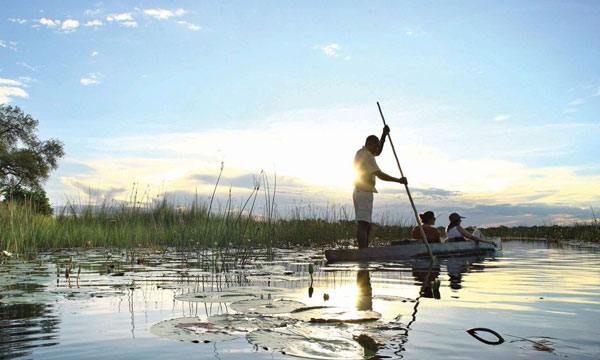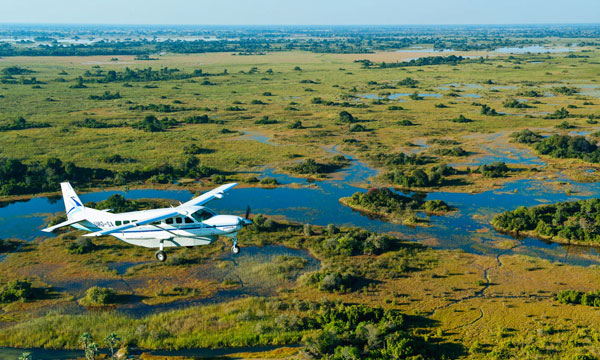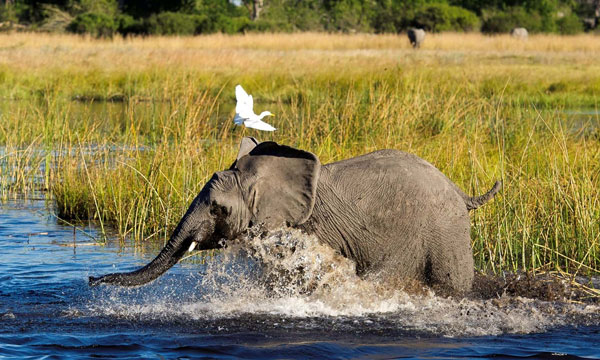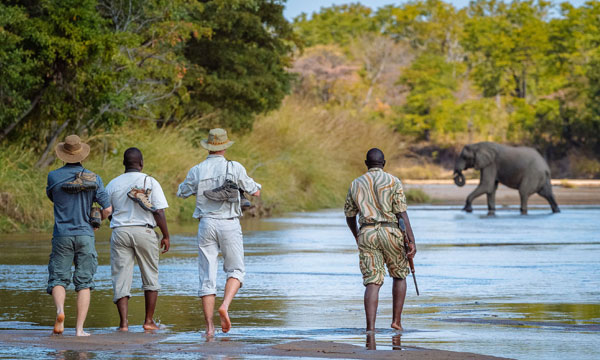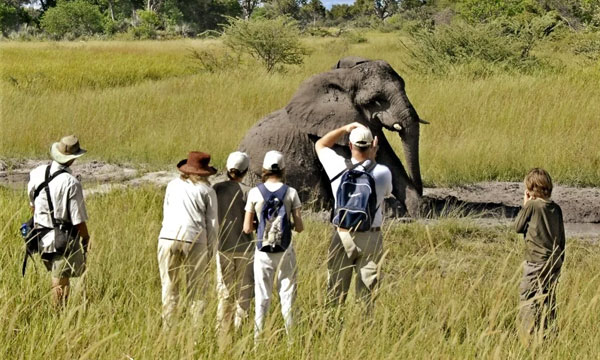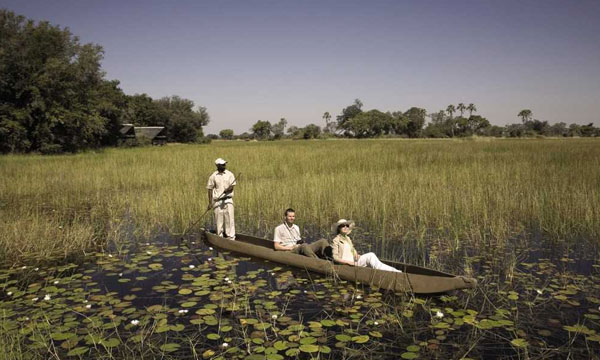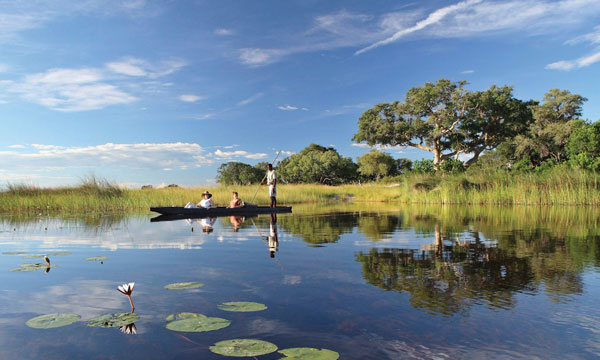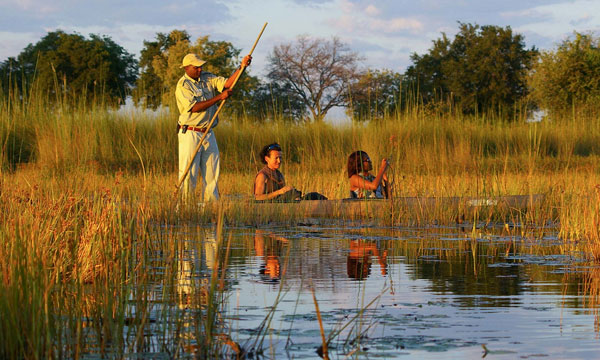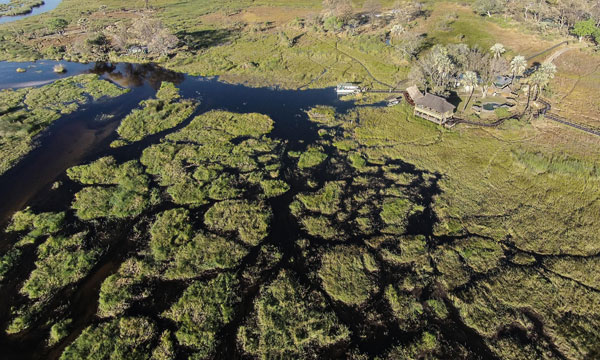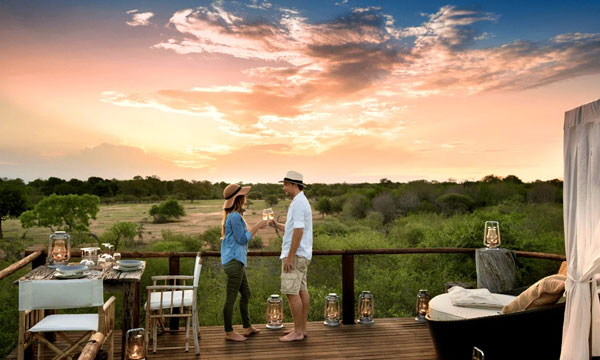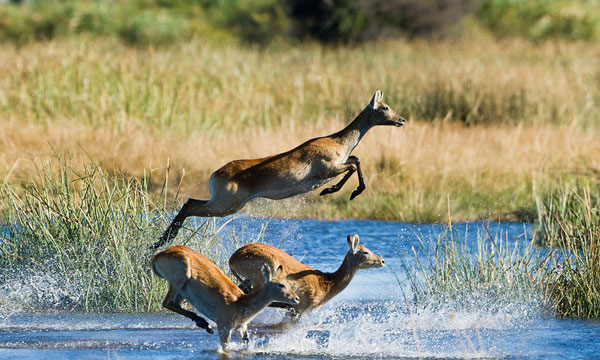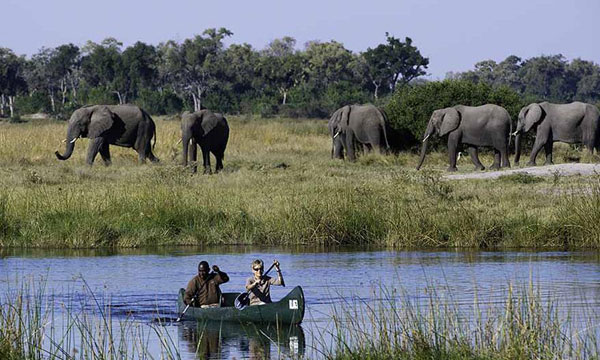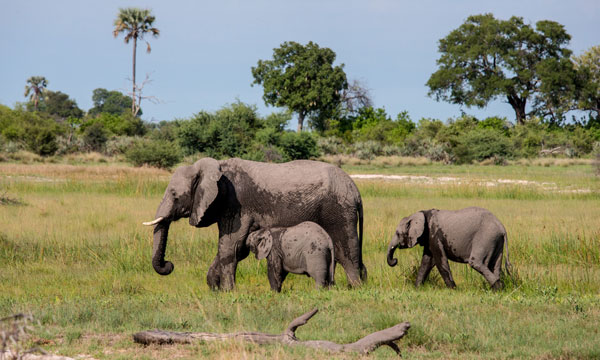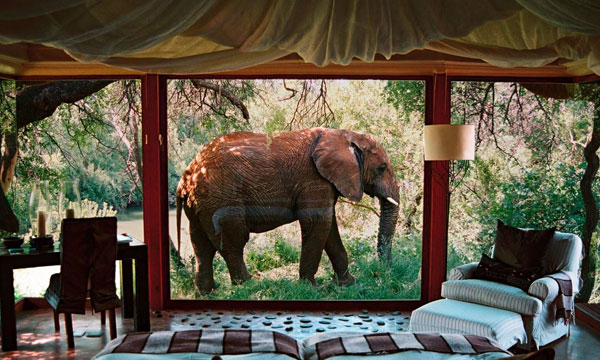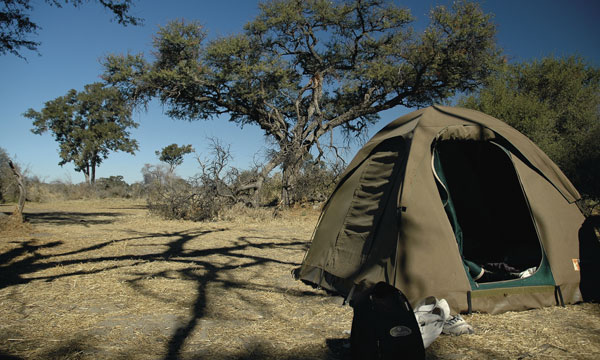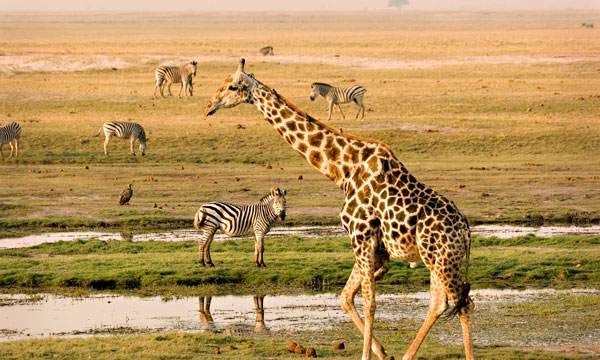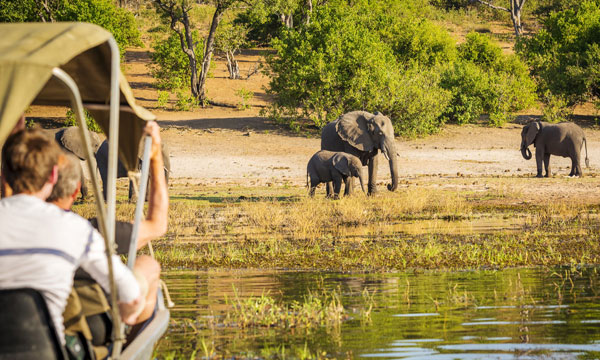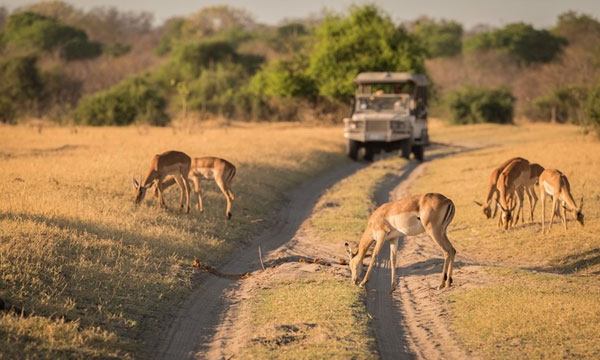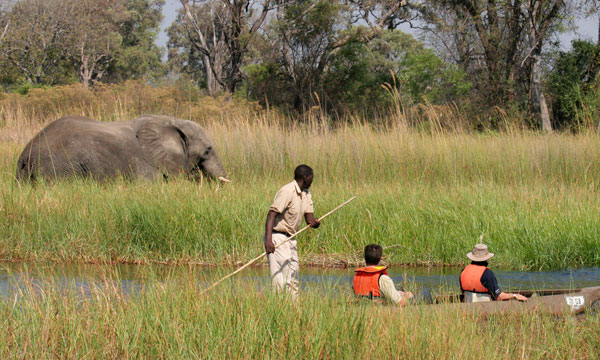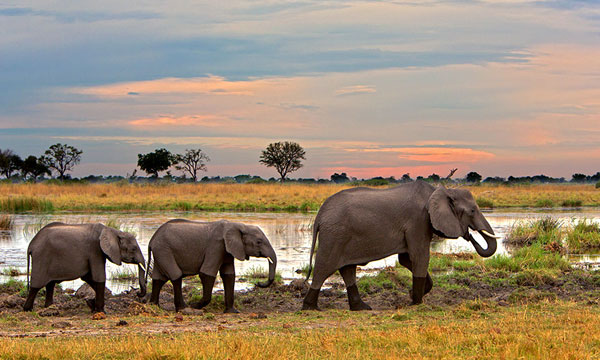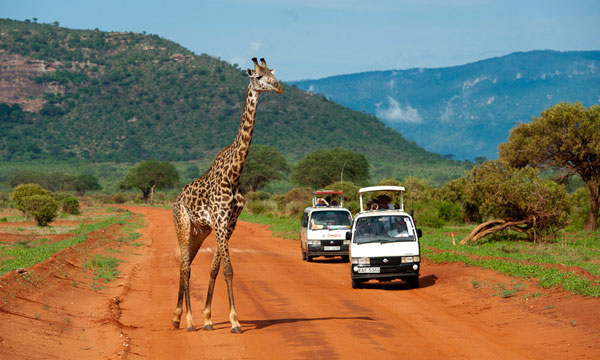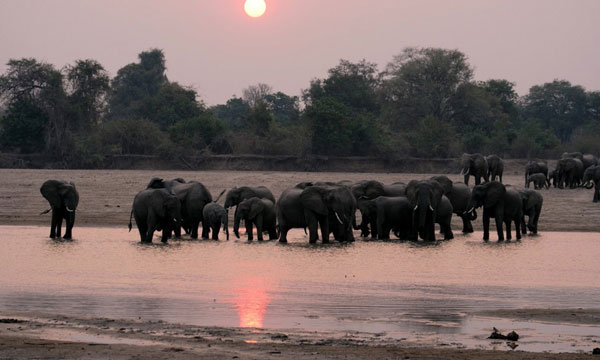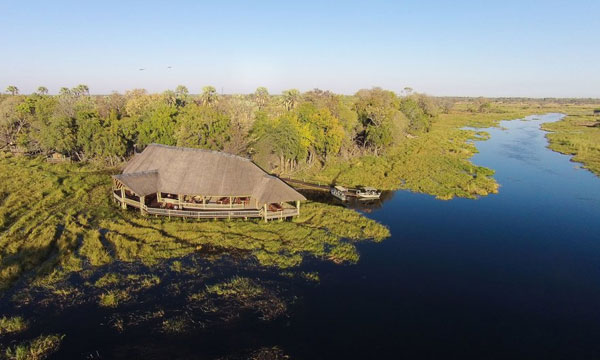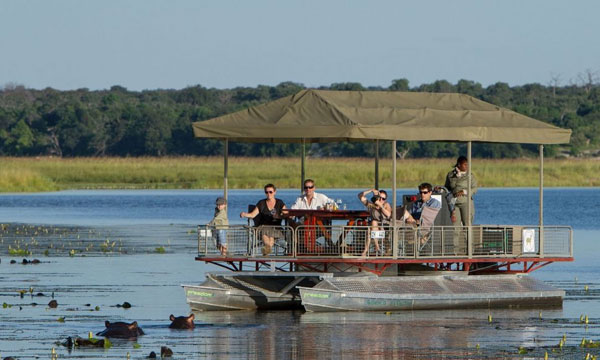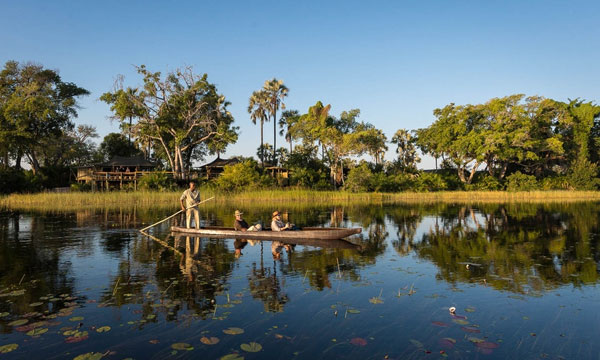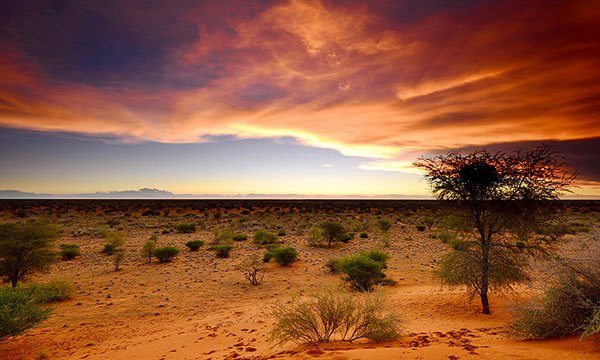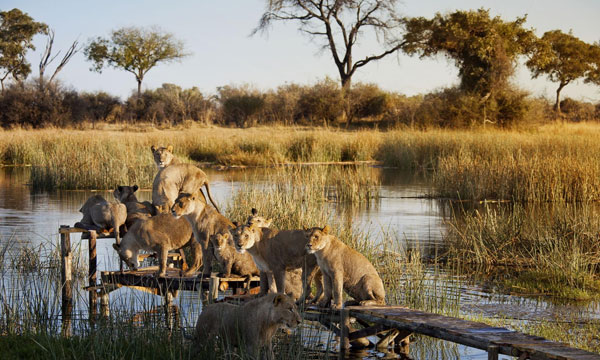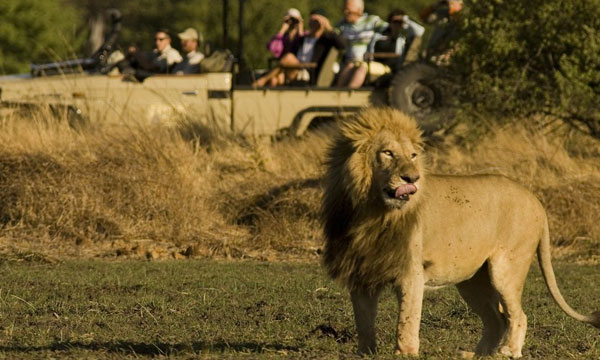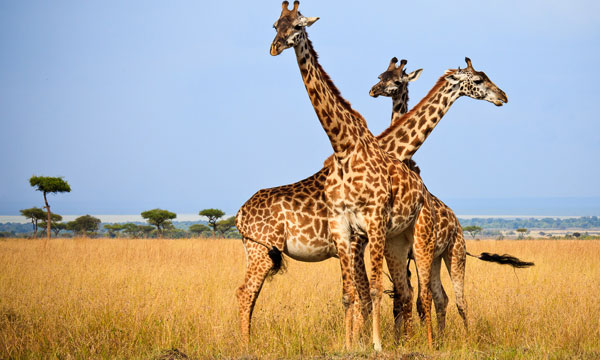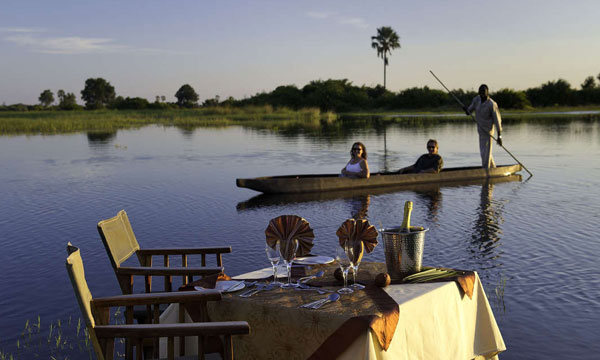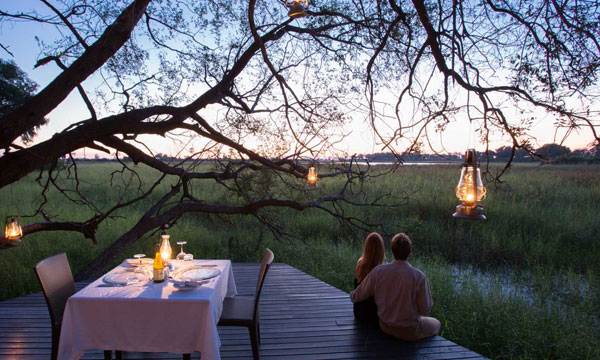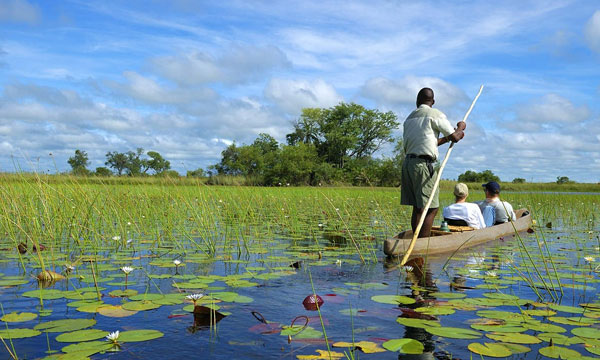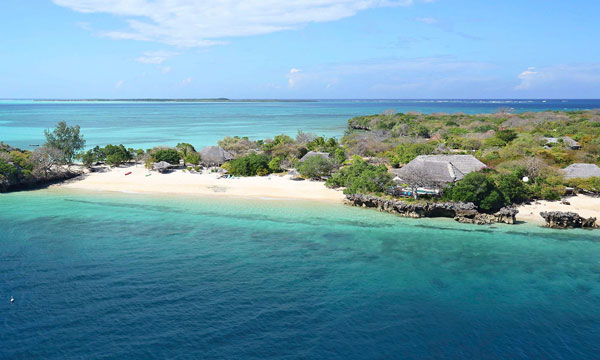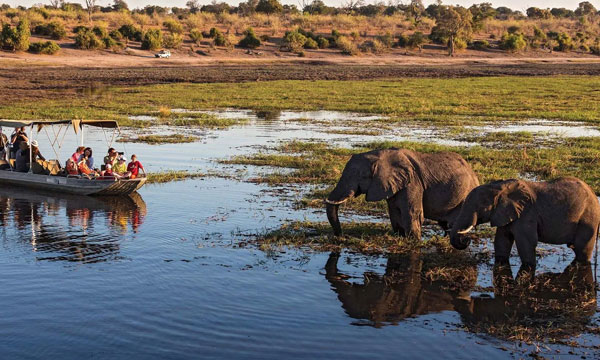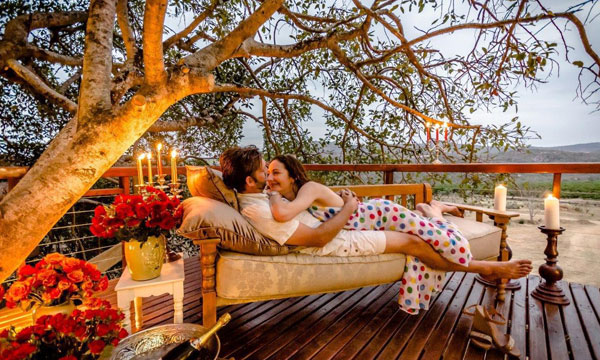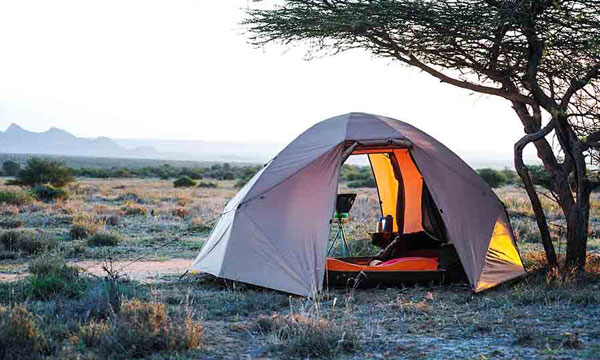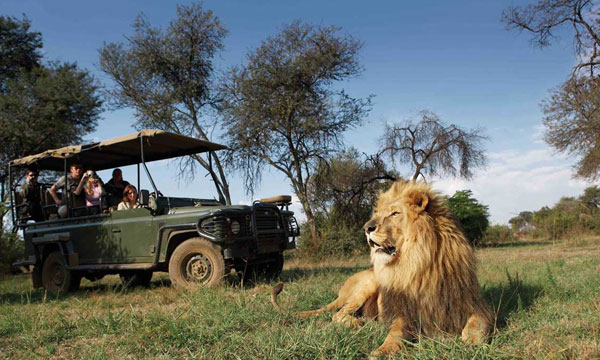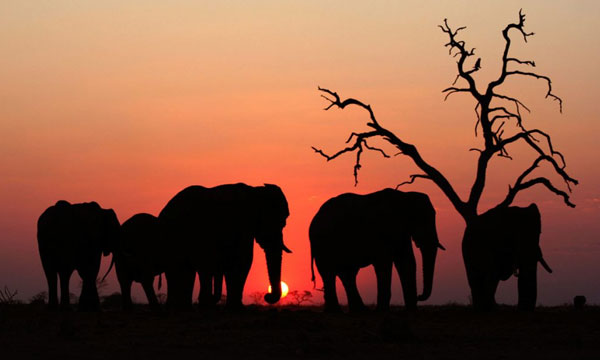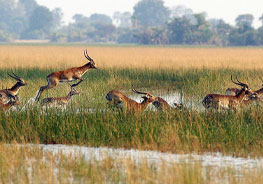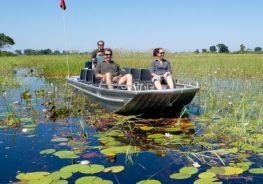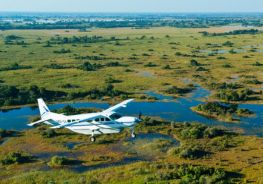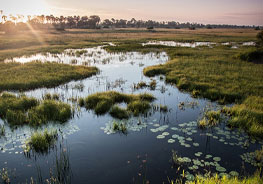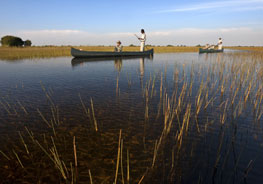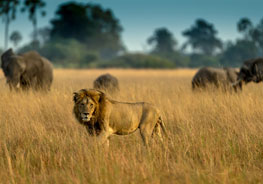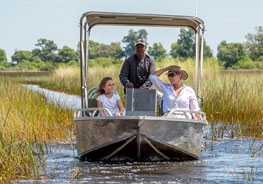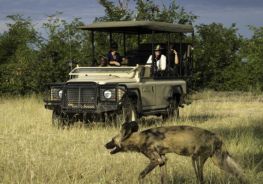Call Us
8:00am - 17:00PM
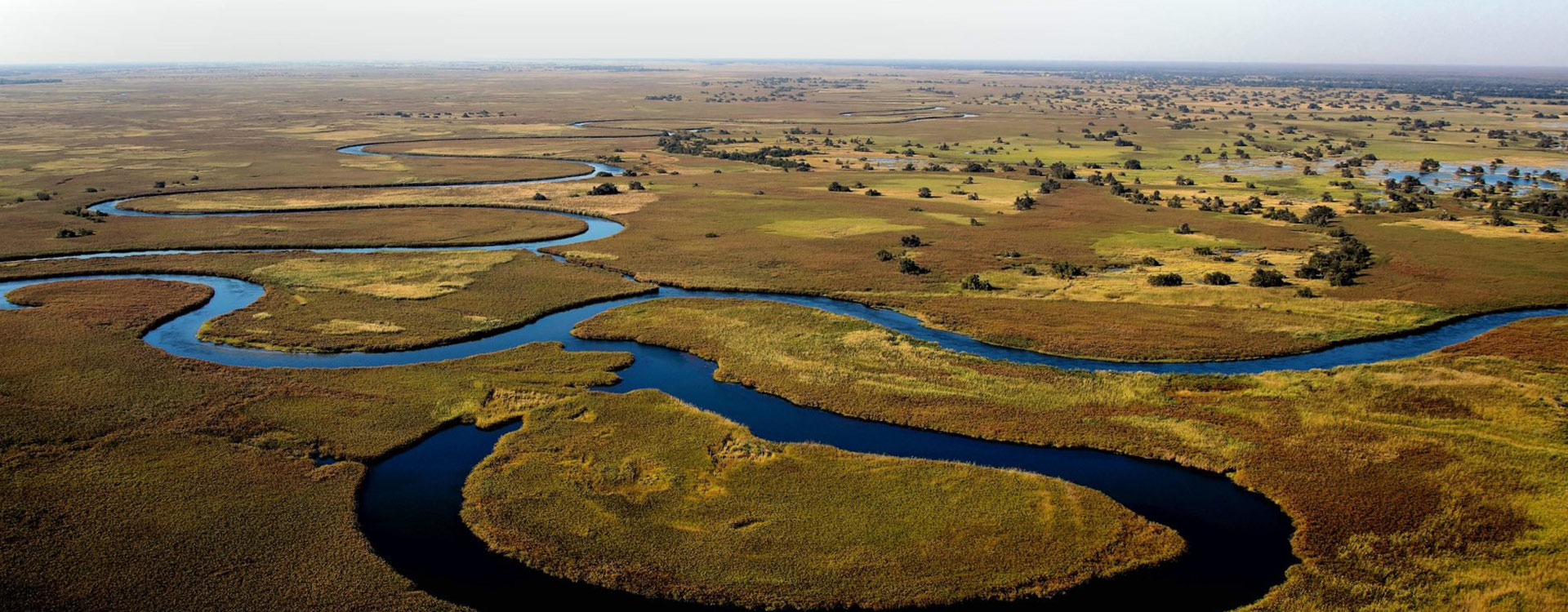
Okavango Delta
About Okavango Delta
The Okavango Delta is one of Botswana’s Top Tourist Attractions. It is a unique pulsing wetland that covers between 6 and 15 000 square kilometres of the Kalahari Desert. It owes its existence to the Okavango (Kavango) River which flows from Angola into Botswana. It is a big bucket list item for many travellers that want to go on a Botswana Safari. The beauty of the delta does not only attract humans alike but is also a great source of life for the wildlife that comes to the delta. It has an average of 100 000 people that visit the 60 or so lodges and camps in the area.
The Okavango Delta is one of Botswana’s top tourist attractions and it has so much to offer. It is ideal for families, solo travellers and groups as well. Let’s get in through this amazing Botswana Destinations.
Okavango Delta Tours and Safaris
We Think You’ll Love
BEST TIME TO VISIT
The Best Time To Visit Okavango Delta is between July and October. During these months, wildlife viewing is at its peak, offering cherishing encounters with the delta's diverse animals. While the wet season from January to March makes some regions hard to access, the unique phenomenon of the floods arriving in the dry season in the delta creates perfect conditions for mokoro trips. It’s a time when thrilling wildlife encounters and peaceful water journeys come together beautifully.
WILDLIFE
In the Okavango Delta, wildlife viewing is exceptional, with the dry season drawing large numbers of herbivores, which in turn attract carnivores. Moremi Game Reserve is a hotspot for seeing four of the Big Five, including rare sightings of reintroduced black and white rhinos. The Delta's unique ecosystem supports swamp-adapted animals like the red lechwe, seen in large herds, and the elusive sitatunga. Notably, the Okavango Delta Wildlife provide prime area for observing wild dogs, especially during their denning period
What To Experience
we think you will love
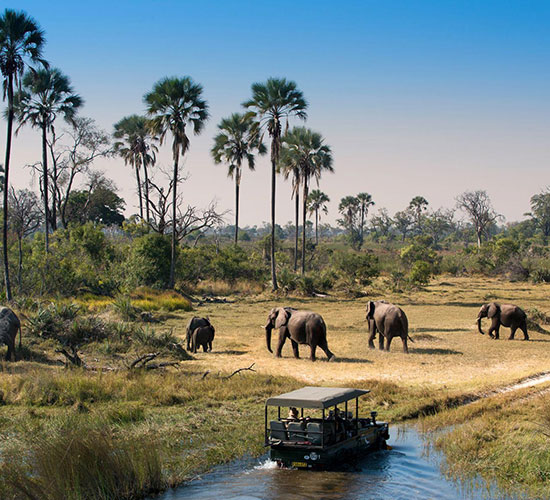
Game Drive
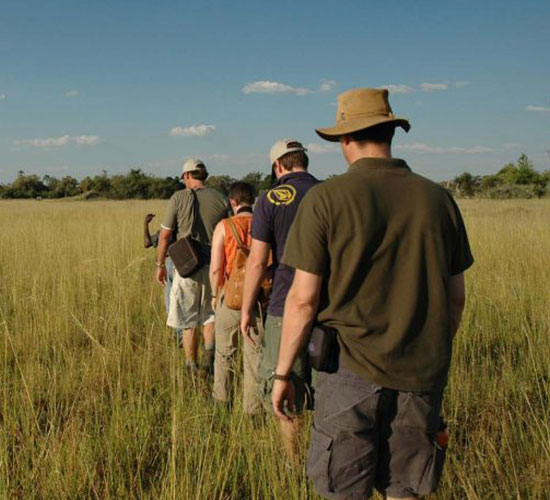
On Foot Game Drive
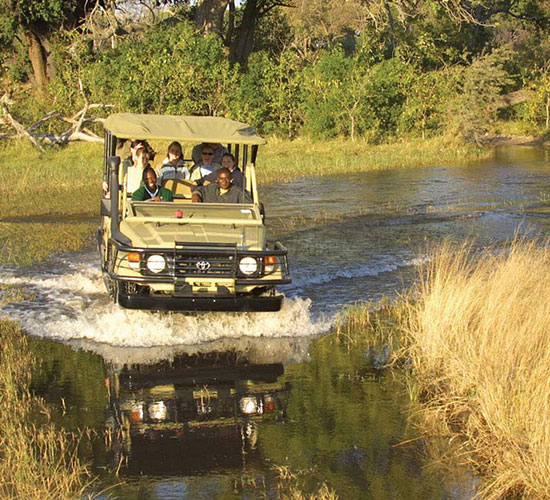
Mobile Safari
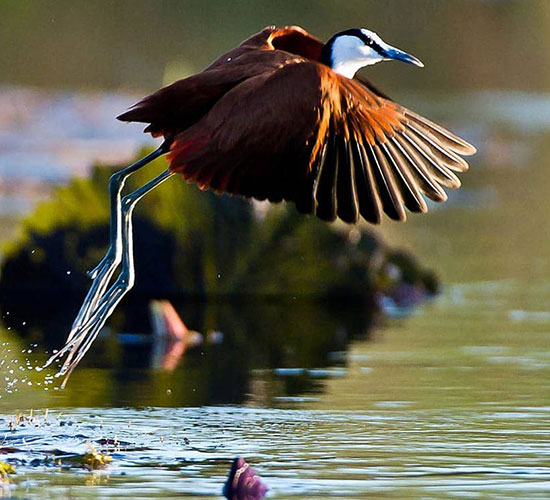
Bird Watching
Travel Guide For Okavango Delta
We Think You’ll Love
Getting To The Okavango Delta
There are so many ways to get to the Okavango Delta and it all depends on where you are coming from.
From Maun
Maun is the closest town to the Okavango Delta. When coming from Maun, the Okavango Delta is about 65 kilometres away. Travellers have the option to drive or fly into the Delta depending on their itinerary, travel package or final destination. To get to Maun, there are flights from neighbouring countries, such as Cape Town and Johannesburg. Many safari companies usually arrange transport for travellers to the Okavango Delta from Maun.
From Gaborone
From Gaborone, it is not recommended to drive as the distance is nearly 20 hours long. Instead it is better to take a short domestic flight from the regional airport in Gaborone (GBE) to Maun International Airport, which is much closer to the Okavango Delta.
From Johannesburg
From Johannesburg, the best way to get to the Okavango Delta is to fly from the Johannesburg International Airport. The flight is about one and a half hours long into Maun International Airport which is the closest to the Okavango Delta.
From Cape Town
From the city of Cape Town, it's approximately a two and a half hour flight to Maun.
Flights to Okavango Delta
From Maun, you can either choose to drive or fly into the delta. For those hat want to fly into the delta, there are several options available. Popular airstrips include Camp Okavango Airport, Mapula Airstrip and Seronga Airstrip. The choice of airstrip will vary depending on your final destination or safari itinerary.
Facts You Should Know About The Okavango Delta
- The Okavango Delta was designated as the 1,000th UNESCO World Heritage Site in 2014. It was also named one of Africa's Seven Natural Wonders the previous year.
- Between March and August, the delta nearly triples in size. It ranges from 6,000 to approximately 15,000 square kilometres.
- The Okavango Delta is regarded as one of the world's most beautiful wilderness areas. Animals that you might see include elephants, buffaloes, giraffes, hippos, antelope, leopards, hyenas, zebras, and crocodiles. Around 260,000 mammals congregate around the delta during the dry season.
- Many visitors to the delta enjoy water-based safaris on traditional mokoro canoes, which traverse the waterways. These traditional boats were once made from a single piece of wood.
- Animals aren’t the only inhabitants of the delta. The BaSarwa live in the Moremi Game Reserve on the eastern side. The five tribes use the area for fishing, growing crops and hunting.
- The Okavango Delta consists of so many islands, around 150,000 of them. Some are a few metres wide while some are big and can be longer than 10 kilometres.
- The Okavango Delta is very flat across its 15 000 square kilometres.
- The Okavango Delta is home to a large variety of birds including the rare Pel’s Fishing Owl which is one of the few fish-eating owls in the world. There are about 530 bird species alone in the Okavango Delta.
- It's a tragedy that some of the animals in the Okavango Delta are endangered. There are just 5 black rhinos and approximately 35 white rhinos that remain in the delta.
- The Okavango delta receives an average of 100,000 people at the 60 lodges and campsites in the area and this contributes greatly to the economy of the country.
Best Time To Visit The Okavango Delta
The Okavango Delta is overall a good destination to visit regardless of the season or time of year that you decide to visit. Wildlife is abundant and the conditions are generally good all year round. The high season however is between June and August, when the delta is full and flooded. This is the perfect time to experience a mokoro ride (a dugout canoe). Wildlife sightings are good during this time as animals migrate into the delta and are also numerous in September and October. Below is a breakdown of a month by month guide to visiting the delta.
January to April
This is the low season, with rainfall being common and temperatures ranging around 30 degrees. Most of the migratory wildlife would have left the delta but there is still so much to see. Water levels during this time are very low and water-based safaris are only possible in permanent channels. During this period you can take advantage of discounts being offered by camps and lodges.
May to June
This period is the Shoulder season characterised by floodwaters that surge into the delta from the Angolan Highlands. In May, grass levels are at their highest making it difficult to spot wildlife at times.
July to September
This is referred to as the High season where the flood waters move across the delta from the panhandle through to the delta fan. There is wildlife in abundance, clear blue skies, and cool temperatures. Grass levels will have died down by now, making for it a good time to spot wildlife.
October to December
This is also a shoulder season with hot and humid weather. Migratory wildlife and birds leave the area, but for the wildlife that stays, it’s birthing season. This is also a great chance for Botswana Safaris and game viewing. In November the rains come and it’s just after the floodwaters in the delta start to dissipate.
The People Of The Okavango Delta
The people of the Okavango Delta consist of five major separate ethnic groups and each group has its own language and ethnic identity...
The Five Ethnic Groups Are:
- Bugakwe (Kxoe, Bugakhoe, Kwengo,)
- Dxeriku (Dceriku, Diriku, Gceriku, Niriku, Vamanyo)
- Hambukushu (Mbukushu, Bukushu,
- Wayeyi (Bayei, Bayeyi, Yei)
- Xanekwe (Gxanekwe, Bushmen, Swamp Bushmen, Banoka)
For each of these groups, there are different spellings as well pronunciations due to corruptions or misinterpretations. Many outsiders have come and have contributed to the written history of the groups. Since the late 18th century, the Okavango Delta has been under the political control of the Batawana (a Tswana sub-tribe). However, most Batawana have traditionally lived on the outskirts of the Delta.
Small numbers of people from other ethnic groups, such as Ovaherero and Ovambanderu, now live in the Okavango Delta, but because the majority of those people live elsewhere and the habitation is new, they are not considered Okavango Delta peoples. Several Bushmen groups are also represented by a small number of people.
Reasons To Visit The Okavango Delta
The Thrill Of Flying In Over The Delta
Most camps require you to fly in on small bush planes to simple airstrips due to the sprawling nature of the complex waterways and the remote camps that dot the region. Though in some cases this is a necessity rather than a luxury, it's an adventure you'll be grateful for because it will allow you to take in a breath-taking aerial view.
The Beautiful Complex Ecosystem
The Okavango Delta is a natural wonder. It consists of marshlands and seasonally flooded plains and is one of the few delta systems that is completely cut off from the ocean. It's a wonder that a place exists where seasonal rains can support such lush vegetation and wildlife. The area also varies greatly depending on the season, resulting in incredible landscapes.
It’s An Epitome Of Luxury
Apart from wild camping, there isn't much roughing it in the Okavango Delta. Private camps dotted throughout the region provide exclusive comfort, ranging from tented camps to luxurious five-star lodges. Sanctuary Chief's Camp, for example, has large suites with plunge pools, outdoor terraces, private housekeepers, and seasonal mokoro experiences. Although budget accommodation is scarce, the total luxury you'll experience in the private lodges and camps elevates this safari above the ordinary.
It has Beautiful Sunsets And Sunrises
Few experiences compare to the Okavango's cool early mornings and warm night falls. Beautiful sunrises will be greeted with a warm cup of coffee, and glowing sunsets will be accompanied by a cold gin and tonic.
Going On A Safari In The Okavango Delta
We consider a number of important details when planning your Okavango Delta Safari, such as when you want to travel, who is travelling, your preferred comfort levels, how long you want to be on safari, and what pace of safari you prefer. What is the purpose of the safari, and are there any special interests to consider? Are there any particular activities that you enjoy? How can you include Okavango in your overall itinerary? Of course, your budget will be an important consideration when planning your safari.
'The best' Okavango Safari does not exist. The most well-known camps do not always provide the best Botswana Safari experience for you. Forget about awards and glossy magazine articles. We collaborate with you to plan your safari by matching our expert knowledge of the area with your personal interests so that you can have an unforgettable safari.
Most Popular Okavango Delta Safaris
Honeymoon Safari
A safari is inherently romantic and the ideal setting for a honeymoon. Botswana possesses all of the unique characteristics that distinguish it as the top honeymoon destination. Aside from superb game viewing and breath-taking scenery, the Okavango Delta is known for its intimate camps, crowd-free safaris, and truly one-of-a-kind experiences. From private candle-lit dinners afloat in a lily-covered lagoon to helicopter safaris with champagne stops on palm islands and sleeping beneath the stars on private star beds, there's something for everyone.
Family Safaris
Family safaris will help you make the most of your safari experience; specially designed itineraries will pair specialist guides with custom facilities in the delta. Family safaris to the Okavango Delta are becoming increasingly popular, with the delta being an ideal environment for children to learn about nature, wildlife and conservation.
Walking Safaris
The Okavango Delta Walking Safari continues to operate in a remote area of the Okavango Delta with few roads. This tranquil wilderness is characterised by plains dotted with palm-covered islands, river processes that fill with water during the Delta flood and after heavy rains, and tranquil lagoons. Elephant, buffalo, giraffe, and other plains game are common in the area, and lion, leopard, and wild dog are occasionally seen.
You'll explore this area on foot, led by an experienced and fully qualified expert guide and accompanied by a Bushman tracker, interpreting the tracks, looking for the generator of a morning alarm call, explaining animal behaviour, observing big game, and more. If water levels permit, tranquil mokoro (dug-out canoe) expeditions are also available.
Mobile Safaris
The original safari goers would use light mobile safari camps to explore the African wilderness before camps were built as permanent structures, as most are now, where daily safari activities take place from one established base. A mobile safari provides a wonderful sense of continuity because you will be escorted on your safari by the same professional safari guide and camp staff. In contrast to the traditional safari itinerary, each camp has a different guide.
Riding Safaris
We provides riding safaris in Botswana's Okavango Delta wilderness. You can trot, canter, and gallop through the Delta's wetlands and bushland while taking in the breath-taking scenery. This is open country with excellent terrain for riding alongside zebra, giraffes, or buffalo, providing an excellent opportunity to see wildlife up close. Experienced guides will take you through on the safaris to ensure your safety.
Wildlife in the Okavango
Cheetah, wild dog, lion, leopard, and hyena are the top predators in the Okavango Delta. Large herds of elephants also roam the area in search of water and food. The Okavango Delta is an ideal habitat for Cape Buffalo. Some herds can contain over a thousand buffaloes.
Buffaloes are the third most abundant antelope in the Okavango and have a reputation for being extremely dangerous, so the ever-elegant antelopes are well represented in the Okavango Delta: springbok, tsessebe, impala, and the rare red lechwe are frequently seen. The Okavango Delta has over 560 recorded bird species, which thrive in Botswana's undisturbed natural vegetation.
Best Month to Visit Okavango Delta
We Think You’ll Love
Peak
Low
Mixed
Okavango Delta in January
January in the Okavango Delta brings the rainy season, with afternoon thunderstorms common. It's quieter and offers great safari deals. Despite lower water levels, game viewing remains excellent, making it a good time for those seeking a peaceful Okavango Delta Safari experience.
Okavango Delta in February
February continues the trend of unpredictable weather with lush landscapes. The Okavango Delta's water levels are low, yet it's a vibrant time for wildlife, providing unique Okavango Delta Activities amidst the greenery.
Okavango Delta in March
March in the Okavango sees similar conditions to January and February, with the area still lush and green. It's an underrated time for an Okavango Delta Safari, offering serene views and great wildlife spotting opportunities.
Okavango Delta in April
April marks the beginning of rising floodwaters in the Okavango Delta, making it ideal for boat and mokoro trips. The north and west regions are particularly beautiful, offering Okavango Luxury Safari experiences.
Okavango Delta in May
By May, the Delta attracts more animals to its floodwaters, especially in the northern concessions. It's a favourite month for many, offering cooler Okavango Delta Safari Packages and although predator sightings are fewer, skilled guides ensure memorable wildlife encounters.
Okavango Delta in June
June sees vegetation thinning, improving predator spotting. It's one of the best times for varied safari activities. Planning ahead of time is advised due to its popularity among Okavango Delta Safari enthusiasts.
Okavango Delta in July
From July onwards, the Delta is bustling with activity, especially for spotting the African wild dog in the northern areas. It's also when the Delta reaches its peak, filling the channels and creating a haven for Okavango Delta Wildlife.
Okavango Delta in August
August offers peak safari season in the Okavango Delta, with excellent wildlife viewing and bird nesting. The catfish run begins, attracting predators and making it a fantastic time for Okavango Delta Activities.
Okavango Delta in September
September is the prime time for predator sightings, especially in Moremi Game Reserve. Animals gather in the Delta seeking water, making it a spectacular time for an Okavango Safari.
Okavango Delta in October
Again, the predator sightings are at their best in October too, especially in Moremi Game Reserve. The dry conditions lead many animals to migrate to the Delta, enhancing the Okavango Safari experience with abundant wildlife.
Okavango Delta in November
Early November remains hot, with the rainy season and antelope birthing season on the horizon. The Delta becomes a nurturing ground for new life, attracting predators and enriching the Okavango Delta Activities.
Okavango Delta in December
As the second wettest month, December transforms the Delta with dramatic afternoon showers, rejuvenating the bush. This month offers a fresh perspective on the Okavango Delta Safari, with vibrant new life and landscapes.
Related Okavango Delta Travel Guide
We Think You’ll Love
Frequently Asked Questions
We Think You’ll Love
May to October is the best time to visit Okavango Delta. As the water level is at its highest in these months, it becomes ideal for game viewing. The Okavango Delta is the world’s largest inland delta and a UNESCO World Heritage Site.
Being the largest inland in the world, Okavango Delta is worth visiting. Located in the heart of the Kalahari Desert, this is the place where you can explore the vast wildlife and serene nature in a canoe ride. Okavango Delta is also a perfect place for birding.
Visiting Okavango Delta on a budget is possible if just have to do careful planning, here are some tips that can help you
- Choose a local tour operator/ local guide instead of an International tour operator.
- Travel in rainy or shoulder season
- Join a group safari instead of booking a separate one.
- Choose a low accommodation option.
$150, Okavango Delta Tour costs you around $150 per day per person. This includes pick and drop service from your hotels and lodges, accommodation, game viewing, and meals.
Yes, you can visit Okavango Delta, by self-drive. The south gate of the Moremi game reserve is the entry point to the Okavango Delta. From Maun city, it takes a two-hour drive to the South Gate of Moremi game reserve.
There are plenty of options to get to the Okavango Delta. If you want to come by air, the nearest airport is Maun airport, located in the north of Botswana. Air Botswana operates its daily flight from Johannesburg to Maun Airport. After arrival at Maun Airport, all visitors are transferred to their respective lodges and hotels by light aircraft.
Okavango Delta, located in the heart of Kalahari Desert, is a perfect place for those who want to witness authentic wildlife and surreal nature. The special thing about Okavango Delta is here you can go on a canoe ride (traditionally known as mokoro).
Botswana, the Okavango Delta is located in western Botswana. Covering an area of 16,000 s q km, Okavango Delta is the largest inland delta in the world and a UNESCO World Heritage Site. Here you can its vast flora and fauna on a canoe ride.
Yes, a small number of people from Ovaherero and Ovambanderu live in the parts of the Okavango Delta. Along with these people, some other groups of people that live are Hambukushu, the Bayei, and the Ba.
A truly beautiful sight to behold, the Chobe National Park is one of the most popular attractions in Africa and makes Botswana a must-visit destination.
Yes, you can directly fly to Okavango from Maun International Airport by light aircraft or charter plane. The Maun Airport is also known as the gateway to Okavango Delta.
Okavango Delta is famous for being the world’s largest inland delta and a UNESCO world heritage site. This delta is known as the river that never finds the sea. Tourists can easily spot the big five roaming around the waterways.
Okavango is a river in the southwest of central Africa, originated from central Angola, and flows towards the south-east. Okavango River flows on the border between Angola and Namibia. Following across the Caprivi Strip it enters Botswana. In Botswana, it forms the world’s largest delta known as Okavango Delta.
The unique thing about the Okavango River is it never reaches the oceans and it forms the largest inland delta in the world known as Okavango Delta. What makes it more unique is this river floods in the dry season in Botswana.
Located in northern Botswana, the Okavango Delta is the finest safari destination in Africa. What makes it special, is the canoe ride. You can see its vast wildlife and wilderness on a canoe ride. It is also home to the big five and over 400 bird species.
28, Okavango Delta has 28 camps and lodges. All the lodges and camps range from budget to mid-range and luxury. Based on the activities the lodges are categorized into water, land, and mixed camps.
28, Okavango Delta has 28 camps and lodges. All the lodges and camps range from budget to mid-range and luxury. Based on the activities the lodges are categorized into water, land, and mixed camps.
We are thrilled to help you plan your perfect safari holiday
We'd be delighted to help you with any questions you have about properties & safaris. Please fill in the form below so that we can help you create your perfect safari holiday.
Or
Contact Us
Feel free to give us a call or send us an e-mail:
Start Planning Your Tailored African Safari

Expert Safari Knowledge
With decades of expertise, we're your trusted safari guides, ensuring every moment exceeds your expectations.

Tailor-made African Safaris
Tailored to your preferences, our African Safaris guarantee an adventure perfectly suited to your desires.

Long-term Relationships
Our enduring partnerships across Africa provide exclusive access and authentic experiences.

Carefree Travel
Leave your worries behind and accept carefree travel with Falcon Safaris, where every detail is handled to perfection.
Our Travelers Say
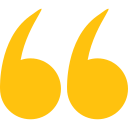
We travelled with Falcon Safaris in Zimbabwe and Botswana for 16 days. Falcon designed a wonderful trip with private guide to the most interesting sites in both countries. The organization of the whole trip was excellent, flights within the country, accommodation and activites. The guides were very knowledgable and told us a lot about the countries, their history, people, economy and much more. We visited the Great Zimbabwe Ruins, the Victoria Falls Tour and a number of national parks in both countries.
Rhino tracking was a real adventure! We had tremendous further game drives and saw very many animals - we did the Big Five. We had much more Victoria Falls Activities than planned and enjoyed very much.We strongly recommend Falcon Safaris to everyone planning a trip to Southern Africa and East Africa.
Wonderful trip to Zimbabwe and Botswana with excellent organization and very competent guides

Our Consultant Vimbai was very helpful and accommodating. We stayed at the Elephant hills hotel which was nothing short of amazing.Our activities included a helicopter flight, dinner cruise as well as a morning game drive. All the activities were absolutely amazing.
Exceptional!

We worked with Gertrude to schedule and organize everything and she did an excellent job. I asked a lot of questions via e-mail and she answered everyone in a timely helpful manner. Our guide at Victoria Falls was also great. He met us at the airport, provided a thoughtful tour of the Falls and got us to our next guide in Botswana. Our lodgings at River View Lodge were just as described- very comfortable and excellent food. All the staff were so pleasant and helpful. If I had to do it again I would arrange a morning boat ride as well. We only did the sunset boat rides and they were the high point of our entire trip- we saw so many animals and our guide was very knowledgeable. Just a great experience. Our lodgings at Oddball's Enclave was rustic and we loved it. So great to disconnect from the world for a bit. Leo, our guide, was the best - got us out and about, saw fantastic wildlife and got back to camp safely each time. Doc manages the camp so well. This whole trip was planned and organized by Falcon Safaris and we could not have been happier.
Fabulous, well planned trip

Falcon safaris have given my the correct advice with excellent service. The only suggestion will be to work closer with the lodges to confirm bookings as soon as possible. We have booked and pay our deposit a year in advance. We have only receive our final convermation from Chobe Safari lodge a week before departure. I do realize its not within your controle but with limit alternatives and a group of 14 people it becomes an issue to find alternative accomodation if the booking was cancelled.
Excellent and efficient service
Explore Our Africa With Customize Your Tour
We love Africa's diversity and create amazing trips for you. With 30+ years of experience, we customize every trip just for you.


